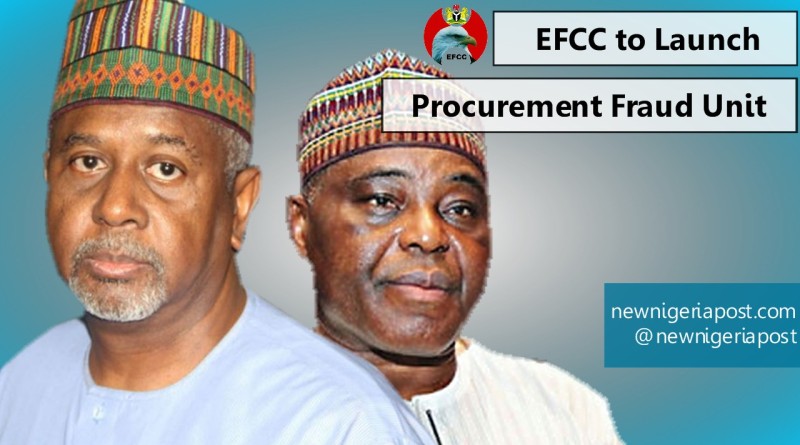Will EFCC’s Proposed ‘Procurement Fraud Unit’ Work?
By Nero Ughwujabo
EFCC has hinted that the agency will be launching a special unit to tackle procurement fraud. Ibrahim Magu, Acting Chairman, The Economic and Financial Crimes Commission (EFCC), on Wednesday, December 16, 2015 indicated his resolve to create a new Unit, to be known as Procurement Fraud Unit (PFU), with a view to strengthening the Commission’s efforts in fighting corruption.
“I am so concerned about procurement fraud. I am thinking of establishing a Unit, purely on procurement fraud. When put in place, it will go a long way in checking corruption”, Magu said.
He statement came at a meeting with a coalition of Civil Society Organisations. Magu reinstated his, and the EFCC’s commitment to tackle all types of corruption and sought the support and collaboration of all stakeholders.
“The task of fighting corruption is herculean and should not be left in the hands of anti corruption agencies alone. Your participation and support for the anti corruption fight is key. Most importantly, I need your help to do the job. Let’s put heads together and move this country forward” – Magu
But what is procurement Fraud and will the approach be helpful?
 Procurement fraud is any fraud relating to a purchasing goods, services or commissioning construction projects from third parties. Fraud can happen when the tender process has not been followed so that fraud can be committed, or when there is bid rigging. It can also happen when there are payment claims for goods or services that were not delivered or were inferior to what was specified in the order. This is perhaps the most common type of fraud committed by politicians and civil servants in Nigeria. It is estimated to cost the nation billions of Naira every year, with most of the extracted funds ending up in overseas accounts. The latest high-profile case being tackled by the agency is the scandal of the #Armsdealgate also known as #Dasukigate. Some of the aspects of this case that has come to public light is the situation of services procured with no clear documentation and large sums of money paid without a clear corresponding service having been delivered. There is also evidence that suggest other types of procurement fraud has been committed in this case including the use of ‘front-men’, ‘front-companies’, invoice inflation and bogus tenders.
Procurement fraud is any fraud relating to a purchasing goods, services or commissioning construction projects from third parties. Fraud can happen when the tender process has not been followed so that fraud can be committed, or when there is bid rigging. It can also happen when there are payment claims for goods or services that were not delivered or were inferior to what was specified in the order. This is perhaps the most common type of fraud committed by politicians and civil servants in Nigeria. It is estimated to cost the nation billions of Naira every year, with most of the extracted funds ending up in overseas accounts. The latest high-profile case being tackled by the agency is the scandal of the #Armsdealgate also known as #Dasukigate. Some of the aspects of this case that has come to public light is the situation of services procured with no clear documentation and large sums of money paid without a clear corresponding service having been delivered. There is also evidence that suggest other types of procurement fraud has been committed in this case including the use of ‘front-men’, ‘front-companies’, invoice inflation and bogus tenders.
The establishment of a specialist unit to tackle this sort of fraud is indeed a welcome development as it will afford the agency an opportunity to build the necessary expertise for detection, investigation and prosecution. In the long run, this will have a strong deterrent effect. However, it will not address the complexity and proliferation of procurement fraud in our public sector. The role of EFCC is enforcement, such that where fraud is detected, its resource will generally be channelled into investigation and prosecution which is expensive and rarely ends in a conviction or the recovery of the stolen funds. Needless to say, such a Unit, would not have stopped #Dasukigate.
Magu will do well to advice and support the Federal government in strengthening its fraud prevention approach. Work being undertaken by the Buhari administration currently to detect and recover fraudulent extraction of funds demonstrates an immediate opportunity for all ministeries, agencies and departments and the wider public sector to undertake a similar contracts and payments review; and to declare a ‘payment by results’ approach on all outstanding contracts.
The Buhari administration must seek to implement and strengthen public sector procurement policy and process present with a view to designing out fraud risk. Centralisation, lean procurement and greater transparency in public spending can all be implemented in such a way as to reduce the fraud risk whilst making the processes quicker, simpler and public funds going further in the public interest. Designing fraud risk out of procurement processes at an early stage will leave a work for the already over-burdened EFFC.


